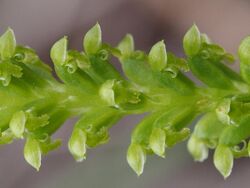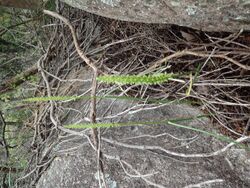Biology:Microtis media
| Common mignonette orchid | |
|---|---|

| |
| Part of the flowering stem of Microtis media | |
| Scientific classification | |
| Kingdom: | Plantae |
| Clade: | Tracheophytes |
| Clade: | Angiosperms |
| Clade: | Monocots |
| Order: | Asparagales |
| Family: | Orchidaceae |
| Subfamily: | Orchidoideae |
| Tribe: | Diurideae |
| Genus: | Microtis |
| Species: | M. media
|
| Binomial name | |
| Microtis media | |
| Subspecies | |
|
See text | |
Microtis media, commonly known as the common mignonette orchid,[2] is a species of herbaceous plants of the family Orchidaceae endemic to the south–west of Western Australia. It has a single tubular leaf and up to one hundred small, yellowish green flowers arranged along the flowering stem.
Description
Microtis media are deciduous, chlorophyllous, sympodial, tuberoid terrestrial orchids with a single, tubular leaf 250–650 mm (9.8–25.6 in) long that encloses the lower one-third to half of the flowering stem. The flowers are green, 2.5–3 mm (0.098–0.118 in) wide, arranged around an erect flowering stem 200–600 mm (7.9–23.6 in) high. The dorsal sepal forms a hood over the column and the petals face forwards. The lateral sepals are curled. The labellum is thick and has a more or less rough, irregular margin and a raised callus.[2][3][4]
Taxonomy and naming
The species was first formally described by Robert Brown in 1810 from a specimen collected at King George Sound in 1801. The description was published in Prodromus Florae Novae Hollandiae et Insulae Van Diemen.[5][6] The specific epithet (media) is a Latin word meaning "medium",[7] referring to the intermediate floral structure.[2]
The plant was featured in Curtis's Botanical Magazine in 1825, where it was given the common name middle-sized microtis. According to Allan Cunningham it appeared from a sod of earth containing a Cephalotus, collected by Phillip Parker King from same location, and flowered to provide the source of the illustration by Franz Bauer. The description was "Whole plant, in general aspect, very much resembling the M. parviflora represented in our last plate, but more than twice the size. The flowers too are extremely similar, and the chief difference is to be found in the lip, which is here larger in proportion to the rest of the flower, and it is singularly wedge-shaped, truncated, and obtuse, even retuse at the extremity :–the disk being moreover furnished with two oblong, warty callosities, and the margin of the lower half and apex, with several globose, tuberculated processes".[8]
Subspecies
In 1990, Robert John Bates described two subspecies of M. media and the names have been accepted by the World Checklist of Selected Plant Families:[3]
- Microtis media R.Br. subsp. media[9] has a labellum with a rough, irregular edge and a prominent callus;
- Microtis media subsp. densiflora (Benth.) R.J.Bates[10] has a labellum which is almost smooth and a reduced labellum callus.[3]
(Microtis media subsp. eremicola and M. media subsp. quadrata have been elevated to species status as Microtis eremicola[11] and Microtis quadrata[12] respectively.)
Distribution and habitat
The common mignonette orchid grow in shrubland, woodland and forest, often in seasonally wet areas and on granite outcrops. It occurs in the southwest of Western Australia between Shark Bay and Eyre.[4][13]
Conservation status
This orchid is classified as "not threatened" by the Western Australian Government Department of Parks and Wildlife.[13]
References
- ↑ "Microtis media". World Checklist of Selected Plant Families (WCSP). Royal Botanic Gardens, Kew. http://wcsp.science.kew.org/namedetail.do?name_id=128201.
- ↑ 2.0 2.1 2.2 Brown, Andrew; Dixon, Kingsley; French, Christopher; Brockman, Garry (2013). Field guide to the orchids of Western Australia : the definitive guide to the native orchids of Western Australia. Simon Nevill Publications. p. 288. ISBN 9780980348149.
- ↑ 3.0 3.1 3.2 Bates, Robert (1990). "Notes on the genus Microtis (Orchidaceae) in Western Australia with the description of two new taxa". Journal of the Adelaide Botanic Garden 13: 51–57. https://data.environment.sa.gov.au/Content/Publications/JABG13P049_Bates.pdf. Retrieved 31 October 2019.
- ↑ 4.0 4.1 Jones, David L. (2006). A complete guide to native orchids of Australia including the island territories. Frenchs Forest, N.S.W.: New Holland. p. 225. ISBN 978-1877069123.
- ↑ "Microtis media". APNI. https://id.biodiversity.org.au/instance/apni/486370. Retrieved 9 October 2017.
- ↑ Brown, Robert (1810). Prodromus florae Novae Hollandiae. London. p. 321. https://www.biodiversitylibrary.org/item/21771#page/191/mode/1up. Retrieved 9 October 2017.
- ↑ Brown, Roland Wilbur (1956). The Composition of Scientific Words. Washington, D.C.: Smithsonian Institution Press. p. 522.
- ↑ Cunningham, Allan; Bauer, Franz; et al. Curtis's botanical magazine, 62 Plate 3378
- ↑ "Microtis media subsp. media". World Checklist of Selected Plant Families (WCSP). Royal Botanic Gardens, Kew. http://wcsp.science.kew.org/namedetail.do?name_id=128204.
- ↑ "Microtis media subsp. densiflora". World Checklist of Selected Plant Families (WCSP). Royal Botanic Gardens, Kew. http://wcsp.science.kew.org/namedetail.do?name_id=128202.
- ↑ "Microtis eremicola". APNI. https://id.biodiversity.org.au/instance/apni/589481. Retrieved 9 October 2017.
- ↑ "Microtis quadrata". APNI. https://id.biodiversity.org.au/instance/apni/589482. Retrieved 9 October 2017.
- ↑ 13.0 13.1 "Microtis media". FloraBase. Western Australian Government Department of Parks and Wildlife. https://florabase.dpaw.wa.gov.au/browse/profile/10954.
External links
Wikidata ☰ Q6840428 entry
 |


